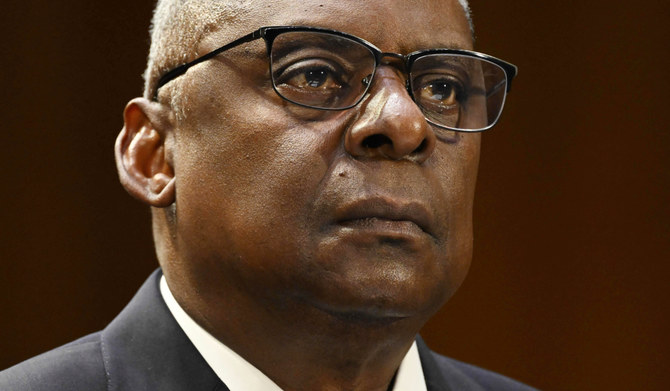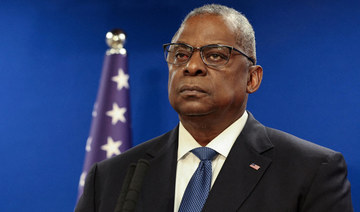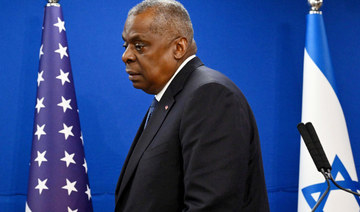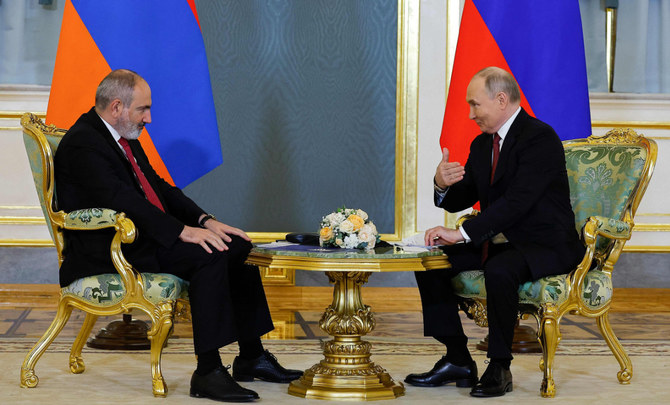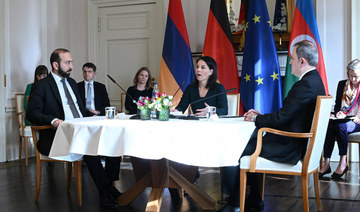WASHINGTON: Defense Secretary Lloyd Austin has prostate cancer, and his recent secretive hospitalization was for surgery and later to treat a urinary tract infection related to that operation, his doctors said Tuesday.
The 70-year-old Austin was admitted to Walter Reed National Military Medical Center on Dec. 22 and underwent surgery to treat the cancer. He developed the infection a week later. President Joe Biden and other senior administration officials were not told for days about his hospitalization or his cancer.
According to the doctors, the cancer was detected when Austin had a regular screening in early December. The said he “underwent a minimally invasive surgical procedure” and went home the next day. But on Jan. 1 he reported nausea and severe abdominal, hip and leg pain due to the infection.
They said his prostate cancer was detected early, and his prognosis is excellent.
The cancer revelation comes after days of persistent questions about Austin’s hospitalization and the delays in notifying key leaders. And it raises more questions about the transparency and truthfulness of the department, which for the past four days said he was initially at Walter Reed for an “elective medical procedure,” and not prostate surgery.
Asked about that choice of wording, Maj. Gen. Pat Ryder, Pentagon press secretary, said in a briefing on Tuesday, it was developed in consultation with Austin’s doctors.
When pressed on the delays in public notification, Ryder said, “Despite the frequency of prostate cancer, discussions about screening, treatment and support are often deeply personal and private ones.” It was still not clear Tuesday how this will affect Austin’s job, travel or other public engagements going forward.
The lack of transparency about Austin’s hospitalization — — including the failure to tell Biden and other top officials about it or the reason for it for days — has triggered sharp criticism. Several Republican lawmakers even said Austin should be ousted. And, earlier Tuesday, the White House chief of staff ordered Cabinet members to notify his office if they ever can’t perform their duties.
Dr. John Maddox, trauma medical director, and Dr. Gregory Chesnut, director of the Center for Prostate Disease at Walter Reed, provided the first details of Austin’s prognosis in a statement put out by the Pentagon. They said he was under anesthesia during the initial surgery, and when he went to intensive care on Jan. 2 the infection had triggered an intestinal backup and his stomach had to be drained with a tube in his nose.
“We anticipate a full recovery, although this can be a slow process,” the doctors said. They noted that prostate cancer is the most common cancer among American men, and it impacts 1 in every 8 men – and 1 in every 6 African American men — during their lifetime.
Meanwhile, the Biden administration, reeling from learning of Austin’s surprise illness last week, is mounting a policy review. And the Pentagon has also launched its own review.
Jeff Zients, in a memo to Cabinet secretaries, directed that they send the White House any existing procedures for delegating authority in the event of incapacitation or loss of communication by Friday. While the review is ongoing, he is requiring agencies to notify his office and the office of Cabinet affairs at the White House if an agency experiences or plans to experience a circumstance in which a Cabinet head can’t perform his or her duties.
Biden and other top officials weren’t informed for days that Austin had been hospitalized and had turned over power to his deputy. A Pentagon spokesman blamed the lapse on a key staffer being out sick with the flu.
“Agencies should ensure that delegations are issued when a Cabinet Member is traveling to areas with limited or no access to communication, undergoing hospitalization or a medical procedure requiring general anesthesia, or otherwise in a circumstance when he or she may be unreachable,” Zients’ memo states. It also requires that agencies document when any such transfer of authorities occurs and that the person serving in the acting role promptly establish contact with relevant White House staff.
A copy of the memo was obtained by the Associated Press.
During Austin’s two hospitalizations, he transferred some of his authorities to Deputy Defense Secretary Kathleen Hicks, but she was not told why. The White House was not informed Austin was in the hospital until Jan. 4, and the public and Congress didn’t learn of it until a day later.
The Pentagon issued a memo Monday on its internal review, and broadened the circle of leaders who would be informed of any delegation of authorities by the defense secretary to ensure that, in the future, “proper and timely notification has been made to the President and White House and, as appropriate, the United States Congress and the American public.”
Going forward, any time authority is transferred a wider swath of officials will also be notified, to include the Pentagon’s general counsel, the chair and vice chair of the Joint Chiefs of Staff, the Combatant Commanders, service secretaries, the service chiefs of staff, the White House Situation Room, and the senior staff of the secretary and deputy secretary of defense.




